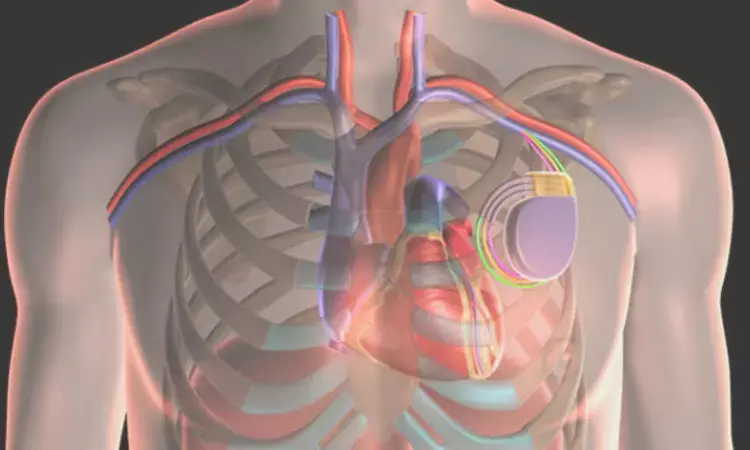- Home
- Medical news & Guidelines
- Anesthesiology
- Cardiology and CTVS
- Critical Care
- Dentistry
- Dermatology
- Diabetes and Endocrinology
- ENT
- Gastroenterology
- Medicine
- Nephrology
- Neurology
- Obstretics-Gynaecology
- Oncology
- Ophthalmology
- Orthopaedics
- Pediatrics-Neonatology
- Psychiatry
- Pulmonology
- Radiology
- Surgery
- Urology
- Laboratory Medicine
- Diet
- Nursing
- Paramedical
- Physiotherapy
- Health news
- Fact Check
- Bone Health Fact Check
- Brain Health Fact Check
- Cancer Related Fact Check
- Child Care Fact Check
- Dental and oral health fact check
- Diabetes and metabolic health fact check
- Diet and Nutrition Fact Check
- Eye and ENT Care Fact Check
- Fitness fact check
- Gut health fact check
- Heart health fact check
- Kidney health fact check
- Medical education fact check
- Men's health fact check
- Respiratory fact check
- Skin and hair care fact check
- Vaccine and Immunization fact check
- Women's health fact check
- AYUSH
- State News
- Andaman and Nicobar Islands
- Andhra Pradesh
- Arunachal Pradesh
- Assam
- Bihar
- Chandigarh
- Chattisgarh
- Dadra and Nagar Haveli
- Daman and Diu
- Delhi
- Goa
- Gujarat
- Haryana
- Himachal Pradesh
- Jammu & Kashmir
- Jharkhand
- Karnataka
- Kerala
- Ladakh
- Lakshadweep
- Madhya Pradesh
- Maharashtra
- Manipur
- Meghalaya
- Mizoram
- Nagaland
- Odisha
- Puducherry
- Punjab
- Rajasthan
- Sikkim
- Tamil Nadu
- Telangana
- Tripura
- Uttar Pradesh
- Uttrakhand
- West Bengal
- Medical Education
- Industry
Synchronized left ventricular pacing as effective as conventional CRT in patients with HF and LBBB

USA: Results from the AdaptResponse study have shown cardiac resynchronization therapy (CRT) using an algorithm designed to minimize unnecessary right ventricular pacing to be non-superior to conventional CRT in patients with systolic HF (heart failure) and left bundle branch block (LBBB).
The findings were presented during the late-breaking clinical trial session at the EHRA (European Heart Rhythm Association) 2023 congress by Bruce Wilkoff, MD (Cleveland Clinic, OH).
The strategy of dynamic CRT, in which the device paces only the LV (left ventricle) when there is intact conduction to the RV (right ventricle), did not reduce the primary endpoint of the study (heart failure events or all-cause mortality) compared with CRT with biventricular pacing. After the follow-up of 8 years, the primary endpoint was seen in 33.7% of patients treated with conventional CRT and 30.8% of those treated with adaptive CRT (HR 0.89).
The trial was terminated early for futility after the third interim analysis. However, the authors noted that delays in clinical event reporting caused by the COVID-19 pandemic appeared to sway the findings.
While the results did not reveal a win for adaptive CRT (AdaptivCRT; Medtronic), according to Wilkoff, there is no reason not to switch on the algorithm in suitable heart failure patients with left bundle branch block. The strategy is simpler than conventional CRT programming and was tied to better battery life, including a 40% reduction in device changeout.
The adaptive CRT algorithm adjusts the pacing based on the patient's conduction system, pacing only the LV during normal atrioventricular conduction and synchronizing the LV with intrinsic RV activation. The device shifts to biventricular pacing if prolonged or blocked AV conduction.
Against the above background, the authors focused on an HF patient population with LBBB. The study involved 3,617 patients with LV ejection fraction ≤ 35%, LBBB (QRS ≥ 130 ms in women and ≥ 140 ms in men), and NYHA class II-IV symptoms despite optimal medical therapy.
Enrollment was stopped in 2019, so only a small number of patients were treated with a neprilysin/angiotensin receptor inhibitor, and almost none were treated with an SGLT2 (sodium-glucose cotransporter 2) inhibitor. In a post hoc analysis, researchers evaluated the primary endpoint stratified by the time spent in LV pacing only.
The authors reported the following findings:
- There was no remarkable difference in any secondary endpoints, including individual assessments of all-cause mortality and heart failure interventions for decompensation, other than a neutral primary endpoint.
- Also, there was no significant difference in a clinical composite score reflective of stability and symptoms between office visits.
- In the post-hoc analysis, the risk of all-cause mortality/HF decompensation was significantly reduced in patients with ≥ 85% synchronized LV pacing versus those in the conventional CRT arm.
- No benefit was seen in those with < 85% synchronized LV pacing compared with conventional CRT.
- Overall mortality rates were meagre, with just 16.5% of the study population dying at five years.
- The mortality, which differed by NYHA class, is the lowest of any randomized CRT trial. In addition, 93% of all patients either stabilized clinically or improved with CRT, the highest response rate yet reported in any randomized trial.
Wilkoff states, "Overall, these findings indicate there is a greater overall benefit of cardiac resynchronization therapy in this population than previously understood."
Dr Kamal Kant Kohli-MBBS, DTCD- a chest specialist with more than 30 years of practice and a flair for writing clinical articles, Dr Kamal Kant Kohli joined Medical Dialogues as a Chief Editor of Medical News. Besides writing articles, as an editor, he proofreads and verifies all the medical content published on Medical Dialogues including those coming from journals, studies,medical conferences,guidelines etc. Email: drkohli@medicaldialogues.in. Contact no. 011-43720751


